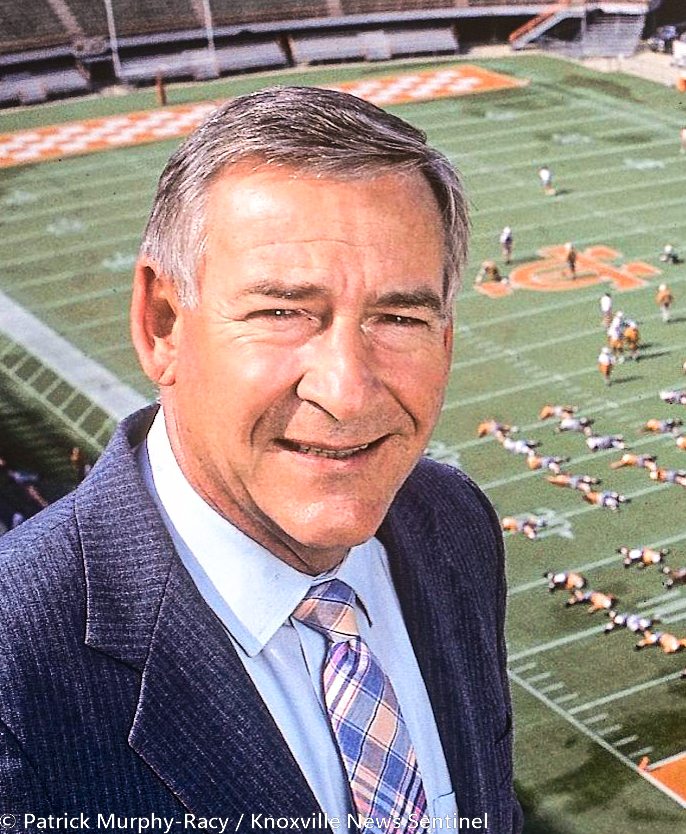The Early Years & College Football Playing Career
Born on 24 June, 1932, Douglas (Doug) Dickey is a former college football player and head coach. Though born in South Dakota, Dickey grew up in Gainesville, Florida, attending P.K. Yonge High School.
Upon graduating high school he attended the University of Florida where he played football for the Florida Gators between 1951 and 1953. He completed his bachelor’s degree in physical education, graduating a year later.
He started his college career playing as a defensive back, eventually changing to position of quarterback under the guidance of head coach Bob Woodruff. Playing as quarterback was clearly where he belonged, with him leading the Florida Gators to a Gator Bowl win against Tulsa in 1953. Woodruff had previously stated the Dickey was “one of the brainiest quarterbacks I ever saw”.
He graduated college in 1954 with a degree in physical education, and then right away enlisted in the Army, serving until 1957.
Coaching History & Timeline
After a year coaching football at St. Petersburg High School in Florida, Dickey switched roles, working as assistant coach at the University of Arkansas, working under Frank Boyles in Fayetteville and staying there for a six-year term until 1963. With Broyles being an acclaimed Hall of Fame coach, Dickey was able to learn from the best and understand what was needed to become a top-level head coach himself.
It’s at this stage that he was recruited to serve as head coach for the Volunteers at the University of Tennessee. At the time, Bob Woodruff was the athletic director who chose Dickey for the position.
At the time he was hired in 1964, it had been seven years since the Volunteers had won more than six games in a season, or been to a bowl game. He was clearly the breath of fresh air the University of Tennessee needed, with him being awarded Southeastern Conference (SEC) Coach of the Year in both 1965 and 1967 respectively. He also created some changes to the team helmets, incorporating the new “T” decal on the sides, as well as having the Neyland Stadium end zones painted in orange and white.
It was evident that this role was meant for Dickey, as everything seemed to fall in place for him. He served as head coach at the University of Tennessee, boasting an impressive win-loss record of 46-15-4. It’s this winning streak that put the Volunteers on the map towards the end of the 1960s. Another notable feat for Dickey was the addition of the first non-white player for the Volunteers, in Lester McClain who was a wide receiver for the team.
After an impressive period at the University of Tennessee, he returned to his hometown of Gainesville in 1970, where he was appointed head coach for the Florida Gators. He was responsible for coaching multiple All-Americans, such as Ralph Ortega, Wes Chandler and John Reaves. He remained at the university for nine years and whilst his record was not as celebrated as his time with the Volunteers, there was still a positive win-loss record to show, with his stats being 58-43-2.
His track record at Florida was not as strong as Tennessee with his final season finishing at 4-7. This loss was a catalyst which eventually lead to The University of Tennessee bringing Charley Pell to replace him in 1978.
His final coaching position was as the offensive coordinator for the University of Colorado in 1979.
Life After Coaching
With his coaching career now completed, Dickey embarked on a completely different, somewhat surprising career.
He has a keen interest in the business world and decided to join the Florida Tile Ceramic Centers Company in Lakeland, Florida. Here, he became their Southeast regional sales manager, followed by four years as the general manager of the company.
However, it’s clear that football and sports were his real passion. So, in 1985, Dickey went back to the University of Tennessee, where Bob Woodruff was retiring as the athletic director. In Woodruff’s eyes, Dickey was the perfect person to take the helm. Dickey relished the opportunity and clearly enjoyed his new role, as he held this position for 17 years, ending in 2002 when he officially retired.
Not only did he give his all when it came to his role as athletics director, he also pushed for growth and improvement in the university’s athletic facilities.
So, it didn’t come as a surprise to people when he was the second recipient of the Foundation’s John. L Toner Award, which is given to athletic directors who have displayed both unwavering commitment and dedication to college athletics.
The Toner Award was one of many he was the recipient of, including the Robert Neyland Memorial Trophy, and an inductee of the Gator Bowl Hall of Fame and Knoxville Hall of Fame. He also served as the president of the Hall of Fame twice, first in 1995 and then again in 1998.
Dickey’s college coaching record was strong, standing at 104-58-6. Whilst he had more success with the Volunteers as opposed to coaching his alma mater, it certainly doesn’t detract from his abilities and skill as a top college coach.
Post retirement, he served three years as chairman of the football rules committee. Currently, he continues to serve on the NCAA Football Issues Committee, the NCAA Certification Committee, as well as the NCAA Competition Cabinet.
Notable Awards
SEC Coach of the Year 1967
SEC Coach of the Year 1969
“Tennesseean of the Year” by Tennessee Sports Hall of Fame 2000
National Football Foundation College Football Hall of Fame 2003

